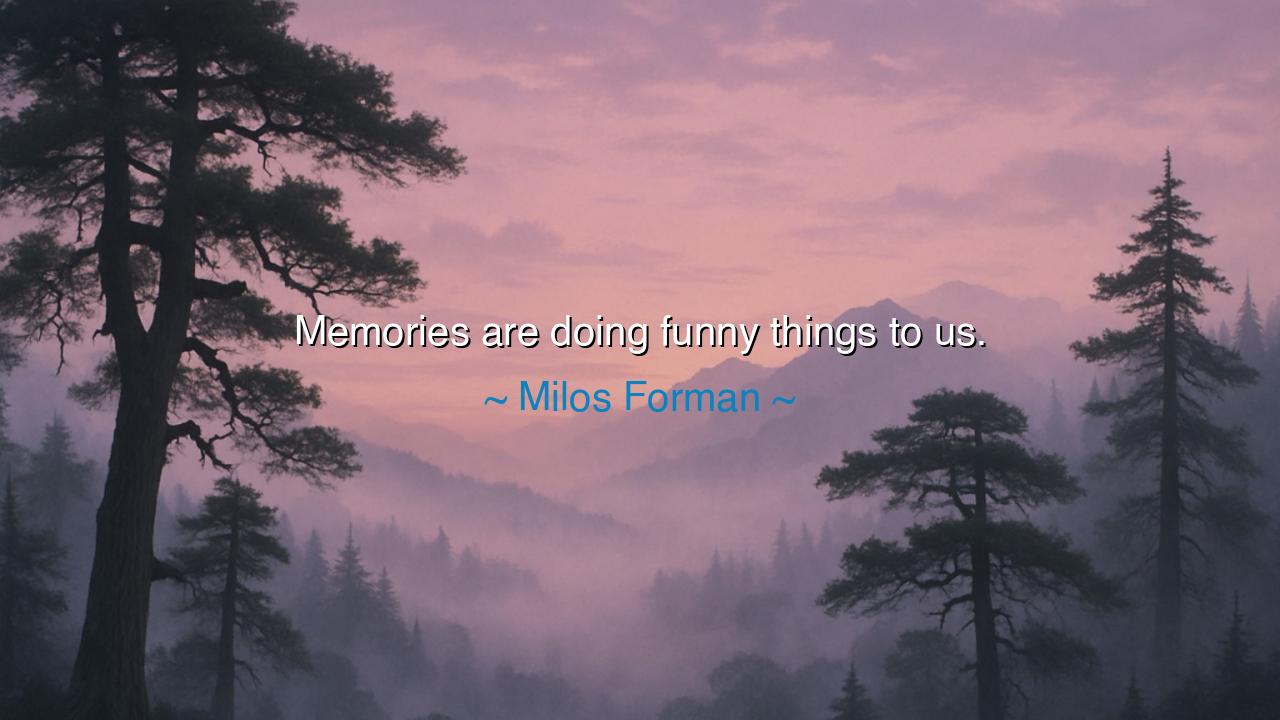
Memories are doing funny things to us.






“Memories are doing funny things to us.” So said Milos Forman, the master of cinema who turned human frailty into art, whose stories wandered between laughter and sorrow, rebellion and forgiveness. His words are soft yet piercing, for they unveil one of the most mysterious workings of the soul: that memory—the tender architect of who we are—can both preserve and distort, heal and haunt. In this brief confession, Forman captures the truth that the past does not rest quietly within us. It moves, reshapes, deceives, and comforts. It is alive.
The ancients knew this well. They spoke of Mnemosyne, the goddess of memory, mother of the Muses. From her womb came all art, all story, all song—proof that remembrance gives birth to creation. Yet they also feared her gift, for memory does not always serve truth. It is colored by longing, by regret, by the fragile need to make sense of chaos. When Forman said that memories are doing funny things to us, he spoke not only as a filmmaker but as a philosopher of the heart. He knew that every person lives in two worlds: the world of now, and the world of what once was—and that sometimes, the second quietly rules the first.
Think of a man who once loved deeply and lost. Over the years, the edges of that love blur. The laughter becomes brighter, the pain softer, until only a golden haze remains. He tells himself that those days were perfect, forgetting the quarrels, the silences, the quiet doubts. Memory has rewritten his past, not out of deceit, but out of mercy. In this way, memory transforms truth into comfort. Yet another man might remember only his failures, every misstep burning brighter than his triumphs. For him, memory becomes a prison. Both are captives of the same power, though their chains are forged from different emotions.
Milos Forman himself knew the duality of memory. Born in Czechoslovakia, he lost his parents to the darkness of the Nazi camps, and yet he grew to make films filled with humor, rebellion, and humanity—One Flew Over the Cuckoo’s Nest, Amadeus, and more. His art was not born from forgetting, but from transforming memory’s sorrow into creation’s fire. The “funny things” memory did to him were not jokes but metamorphoses: it turned grief into compassion, loss into vision. In this way, Forman lived as proof that memory’s distortions can either destroy us or refine us into wisdom.
This is why the wise must treat memory as both teacher and trickster. It whispers to us in the voice of truth, yet behind it lies the echo of our desires. The mind paints the past not as it was, but as it needs to be for the soul to endure. Thus, we must look upon our memories with both reverence and caution. Honor them, for they are the roots of your being; question them, for they are not always honest. As rivers shape the land through endless movement, so do memories carve the soul, changing its form with every reflection.
In every age, nations too have suffered from memory’s “funny things.” They glorify certain stories, erase others, rewrite pain into pride. The Romans celebrated their victories but forgot their cruelties. The same current runs through all of history—the collective memory of humanity reshaping itself to protect, to justify, to dream. The task of the wise is not to destroy these illusions, but to purify them—to seek truth within tenderness.
Therefore, dear listener, take this teaching to heart: cherish your memories, but do not let them rule you. Let them inspire, not imprison. When you recall joy, let it humble you. When you recall sorrow, let it strengthen you. And when memory plays its “funny things,” smile at its trickery, for it is only your humanity reminding you that the past is not stone—it is flame. Memory moves, and through its movement, we learn to live.
So walk forward carrying your memories not as weights, but as lamps. Let them light your path, but never blind your eyes. For as Milos Forman reminds us, it is in the strange, shifting dance of remembrance that we discover not only who we were, but who we are still becoming.






AAdministratorAdministrator
Welcome, honored guests. Please leave a comment, we will respond soon